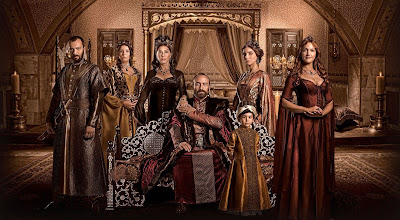Text: Ottomania: a hit TV show reimagines Turkey’s imperial past
Author: Elif Batuman, 2014.
The text “Ottamania: a hit TV show reimagines Turkey’s imperial
past” was wrote by Doctor Elif Batuman, a New Yorker with Turkish heritage
who writes for The New Yorker, an American magazine in which this texts was
published. In the text, she deliberates about the connections between the
Turkish national identity crises, the country’s political scheme, protests at
the Gezi Park and the attention a popular TV show called Magnificent Century gets in this unstable social setting.
The
texts starts with an introduction to Magnificent
Century, a soap opera that started airing in 2011, which talks about an
Ottomanian sultan known as Süleyman the Magnificent. The show focus on the life
of his harem; the intrigues between the sultan’s wife and concunbines, and has become
extremely popular. Batuman explains that the show is part of a trend called Ottomania,
which has spread through a variety of areas from food to design and is characteristic
of the politics of the Prime Minister Recep Tayyip Erdoğan. Erdoğan’s foreign politics
promoted the Ottoman style, however the Prime Minister did not sympathised with
the soap opera plot. He considered that the show did not represent the Turkish
family values, or the values and aspects of the Ottoman Empire that he would
like to present. Batuman emphasizes the controversy of Erdoğan’s disgust for
the show as she explains how Magnificent
Century “conquered” the public from countries with affectionate memory of
the Ottoman rule. In addition to the introduction of the text, Batuman points
that it was Erdoğan’s decision of demolishing the Gezi Park to build a shopping
mall in the style of Ottoman barracks that trigged protests in the country.
In the
text, the author gives important information about Turkish history, especially
about the Ottoman Empire, which allows a general reader to have a better
understanding of the context. It becomes noticeable on it the development of
the identity crisis issue of the Turkish nation over their history. Batuman
also talks about the directors of the TV show, Yağmur and Durul Taylan; about how
they engaged to this project and the difficulties faced in a country with
censorship. The author also discourses about the importance of Roxelana, one of
the sultan’s concubine that married him and gave birth to his successor. She
mentions the disparity in the way that the contemporary Ottoman society
probably viewed her as a ruthless opportunist who only cared about her own
children and the current opinion about Roxelana, which was tremendously
influenced by the soap opera Magnificent
Century. Batuman explains that many believe that Roxelana’s greed and the sultan’s
decision of murdering Mustafa, his first-born with another concubine, is what
lead the Ottoman Empire to its end. A believe that is not supported by Günhan
Börekçi, an Ottoman historian who is one of the consultants for the Magnificent Century show. In addition, Batuman
points out that the soap opera illustrates the identity crisis of Turkish
people, as they for a long time were represented as a nation born by the hands
of Kemal Atatürk, a commander that later became known as “The father of the
turk”.
Paintings of Roxelana
Gezi Park Protestants




This two last pictures posted seem to be very interesting, how are these involved with the text? :)
ReplyDeleteHi Yaiza! The last picture is of some protestants at Gezi Park, which is mentioned in the text. And the other one show two paintings of Roxelana, I added that picture because after seeing a photo of the actress that plays her on the TV Show I was curious to see 'how she looked' (or how she is represented) in other medias, in this case in paintings.
ReplyDelete